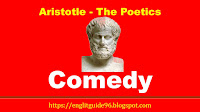Aristotle
- The Poetics
Character
In respect of character there are four things
to be aimed at. First and most important, it must be good. Now any speech or
action that manifests moral purpose of any kind will be expressive of
character: the character will be good if the purpose is good. This rule is
relative to each class. Even a woman may be good and also a slave; though the
woman may be said to be an inferior being and the slave quite worthless. The
second thing to aim at is propriety. There is a type of manly valor but valor
in a woman or unscrupulous cleverness, is inappropriate. Thirdly character must
be true to life: for this is a distinct from goodness and propriety. The fourth
point is consistency: for though the subject of the imitation who suggested the
type, be inconsistent, still he must be consistently inconsistent.
Necessary
or Probable Sequence
As
in the structure of the plot, so too in the portraiture of character, the poet
should always aim either at the necessary or the probable. Thus, a person of a
given character should speak or act in a given way, just as this event should
follow that by necessary or probable sequence. It is therefore evident that the
unraveling of the plot must arise out of the plot itself.
Since
Tragedy is an imitation of persons who are above the common level, the example
of good portrait painters should be followed. They make a likeness which is
true to life and yet more beautiful. So too the poet in representing men should
preserve the type and yet ennoble it. In this way Achilles is portrayed by
Agathon and Homer. These then are the rules the poet should observe. Nor should
he neglect those appeals to the senses which are associated to poetry; for here
too there is much room for error.
Seeing
is Believing
In
constructing the plot and working it out with the proper diction, the poet
should place the scene, as far as possible, before his eyes. In this way,
seeing everything with the utmost vividness as if he were a spectator of the
action, he will discover what is in keeping with it, and be most unlikely to
overlook inconsistencies. The poet should work out his play to the best of his
power and with appropriate gestures. Poetry implies either a happy gift of
nature or a strain of madness. In the one case a man can take the mold of any
character, in the other he is lifted out of his proper self. As for the story
whether the poet takes it readymade or construct it for himself, he should
first sketch its general outline. And then fill in the episodes and amplify in
detail. After this the names being once given, it remains to fill in the episodes.
We must see that they are relevant to the action. In the drama, the episodes
are short but it is these that give extension to Epic poetry.






















0 Comments